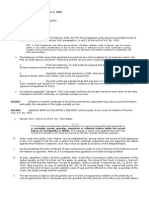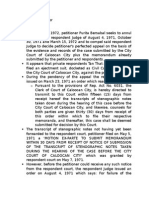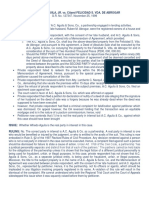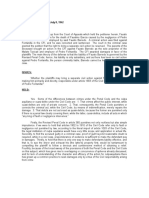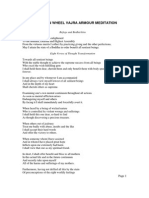Bernardo vs. Bernardo Statcon
Bernardo vs. Bernardo Statcon
Uploaded by
Nichole LanuzaCopyright:
Available Formats
Bernardo vs. Bernardo Statcon
Bernardo vs. Bernardo Statcon
Uploaded by
Nichole LanuzaOriginal Description:
Copyright
Available Formats
Share this document
Did you find this document useful?
Is this content inappropriate?
Copyright:
Available Formats
Bernardo vs. Bernardo Statcon
Bernardo vs. Bernardo Statcon
Uploaded by
Nichole LanuzaCopyright:
Available Formats
BERNARDO vs.
BERNARDO
FACTS: On December 31, 1947, the Republic of the Philippines purchased from
Roman Catholic Church the estate known as the “Capeliana de Tambobong” in
Malabon, Rizal under the provisions of Sec. 1 of Commonwealth Act No. 539, which
authorizes the expropriation of purchase of private lands and that lands acquired
thereunder should be subdivided into lots, for resale at reasonable prices to " their
bona fide tenants or occupants."
Respondent Bernardo applied to the Rural Progress Administration for the
purchase of the lot in question. Petitioners Enrique Bernardo, et al., contested the
application and claimed preferential right to such purchase. Subsequently, the Rural
Progress Administration resolved to recognize the petitioners as entitled to
preference.
ISSUE: WON the petitioners are entitled to such preference
HELD: No. The term "bona fide occupant" (admittedly petitioner is not a tenant) has
been defined as "one who supposes he has a good title and knows of no adverse
claim" (Philips vs. Stroup, 17 Atl. 220,221); "one who not only honestly supposes
himself to be vested with true title but is ignorant that the title is contested by any
other person claiming a superior right to it" (Gresham vs. Ware to that of a
possessor in good faith in our Civil Law (Civil Code of 1889, art. 433; new Civil Code,
art. 526). The essence of the bona fides or good faith, therefore, lies in honest belief
in the validity of one's right, ignorance of a superior claim, and absence of intention
to over each another.
The petitioner Enrique Bernardo falls short of this standard: for the
precarious nature of his occupancy, as mere licensee of respondents, duty bound to
protect and restore that possession to its real and legitimate holders upon demand,
could never be hidden the Tambobong Estate, petitioner had already parted with
the house that was his remaining link with the occupancy of the lot; and since 1945,
even before the Government's purchase, he had been required to vacate.
Thus bereft of all stable interest in the land, petitioner nevertheless seeks to
turn respondent's past deferential regard to his own advantage, and to exploit his
gratuitous stay at respondent's expense for the purpose of ousting his benefactors
and wiping out the investment that the latter, and their predecessors in interest, had
established and preserved charged for the lot in question. That the law, in preferring
"bona fide occupants," intended to protect or sanction such utter disregard of fair
dealing may well be doubted.
You might also like
- The Only Way (Path To Nibbana) : (Complete Edition) by Venerable Ajahn Tong SirimangaloDocument62 pagesThe Only Way (Path To Nibbana) : (Complete Edition) by Venerable Ajahn Tong SirimangaloOclee Evah100% (1)
- Filoteo, Jr. vs. SandiganbayanDocument2 pagesFiloteo, Jr. vs. SandiganbayanRostum Agapito100% (3)
- Parts of StatuteDocument4 pagesParts of Statuteross rodriguez100% (1)
- G.R. No. 101083 - Case DigestDocument3 pagesG.R. No. 101083 - Case DigestBea Cape100% (1)
- Outline LegardaDocument60 pagesOutline LegardaEdz Votefornoymar Del RosarioNo ratings yet
- General V BarramedaDocument2 pagesGeneral V BarramedaPam Ramos100% (1)
- Spouses Delfino Vs St. James HospitalDocument2 pagesSpouses Delfino Vs St. James HospitalPio Guieb Aguilar83% (6)
- Senarillos v. Hermosisima (DIGEST)Document1 pageSenarillos v. Hermosisima (DIGEST)Joseph Paolo Santos100% (1)
- Chapter 8: Mandatory and Directory Statutes (StatCon)Document2 pagesChapter 8: Mandatory and Directory Statutes (StatCon)Czarina Lea D. Morado75% (4)
- Pesca Vs Pesca G.R. No. 136921 Case DigestDocument2 pagesPesca Vs Pesca G.R. No. 136921 Case DigestGringo BarrogaNo ratings yet
- 02 Thermochem vs. Naval DigestDocument1 page02 Thermochem vs. Naval DigestNichole LanuzaNo ratings yet
- The Jesuit OathDocument3 pagesThe Jesuit OathAsta Lyberth100% (1)
- Reed 7 12 Articles of FaithDocument2 pagesReed 7 12 Articles of FaithkawaiimiracleNo ratings yet
- Why Luther Is Not Quite ProtestantDocument41 pagesWhy Luther Is Not Quite Protestantakimel100% (11)
- The Divinity and Humanity of Jesus ChristDocument9 pagesThe Divinity and Humanity of Jesus ChristPeterAkbar100% (1)
- Bernardo v. BernardoDocument2 pagesBernardo v. BernardoGia DimayugaNo ratings yet
- Matuguina Integrated Wood Products, Inc. Vs CADocument1 pageMatuguina Integrated Wood Products, Inc. Vs CAChristine Jungoy100% (2)
- US Vs Limcangco GR 3766Document1 pageUS Vs Limcangco GR 3766Shaine Aira ArellanoNo ratings yet
- 10 Republic (DENR) v. BallocanagDocument4 pages10 Republic (DENR) v. BallocanagSusette Loren TudtodNo ratings yet
- US Vs Ten YuDocument3 pagesUS Vs Ten YuClea Amber FullanteNo ratings yet
- Republic of The Philippines Vs Dominador SantuaDocument2 pagesRepublic of The Philippines Vs Dominador SantuaAbdulateef Sahibuddin100% (1)
- Imbuido Vs ManganonDocument2 pagesImbuido Vs Manganonanastacia cabiliNo ratings yet
- 2 US v. Go Chico (1909)Document1 page2 US v. Go Chico (1909)ABbo HernandezNo ratings yet
- ROOS INDUSTRIAL CONSTRUCTION V NLRCDocument2 pagesROOS INDUSTRIAL CONSTRUCTION V NLRCRemuel TorresNo ratings yet
- Statutory Construction Latin Maxims With CasesDocument2 pagesStatutory Construction Latin Maxims With Casesleslansangan100% (4)
- The Philippine Judicial: System: Pre-Spanish and Spanish PeriodDocument17 pagesThe Philippine Judicial: System: Pre-Spanish and Spanish PeriodFranchesca Revello100% (1)
- Tung Chin Hui Vs Rufus Rodriguez 340 SCRA 765 (Tung Chiu Hui)Document4 pagesTung Chin Hui Vs Rufus Rodriguez 340 SCRA 765 (Tung Chiu Hui)Ryan Jhay YangNo ratings yet
- People V Tamani DigestDocument1 pagePeople V Tamani DigestNori Lola100% (1)
- Justa G. Guido V. Rural Progress Administration, C/O FAUSTINO AGUILAR, Manager, Rural Progress Administration G.R. No. L-2089, 31 October 1949, EN BANC, TUASON, J.Document21 pagesJusta G. Guido V. Rural Progress Administration, C/O FAUSTINO AGUILAR, Manager, Rural Progress Administration G.R. No. L-2089, 31 October 1949, EN BANC, TUASON, J.Calagui Tejano Glenda JaygeeNo ratings yet
- Statcon DigestsDocument15 pagesStatcon DigestspieNo ratings yet
- People of The Philippines v. Tamani (G.R. Nos. L-22160 & L-22161)Document7 pagesPeople of The Philippines v. Tamani (G.R. Nos. L-22160 & L-22161)Ramon T. Conducto IINo ratings yet
- Centeno Vs VIllalonDocument2 pagesCenteno Vs VIllalonRuss TuazonNo ratings yet
- 33 Philippine Consumers Foundation V NTCDocument2 pages33 Philippine Consumers Foundation V NTCjacky100% (3)
- Persons and Family Relations Sample Midterm ExamDocument4 pagesPersons and Family Relations Sample Midterm ExamMary Joessa Gastardo AjocNo ratings yet
- Caudal v. CA, GR No. 83414, July 31, 1989Document3 pagesCaudal v. CA, GR No. 83414, July 31, 1989Judy Anne RamirezNo ratings yet
- 1716-Lapasaran v. People - 578 SCRA 658Document1 page1716-Lapasaran v. People - 578 SCRA 658Estee XoohNo ratings yet
- #12-Digest-Matuguina Wood Vs CADocument2 pages#12-Digest-Matuguina Wood Vs CAJared RiveraNo ratings yet
- Soriano vs. People G.R. No. L-3008, March 19, 1951Document2 pagesSoriano vs. People G.R. No. L-3008, March 19, 1951Jezelle Gois100% (1)
- AGPALO CHAPTER 9, 10, 11: Statutory Construction Notes, Cases and Legal MaximsDocument14 pagesAGPALO CHAPTER 9, 10, 11: Statutory Construction Notes, Cases and Legal MaximsAizaFerrerEbina100% (1)
- Planters Association v. PonferradaDocument6 pagesPlanters Association v. PonferradaArly MicayabasNo ratings yet
- Eliseo Araneta vs. CADocument2 pagesEliseo Araneta vs. CAJnacitaNo ratings yet
- 10 Rules of Statutory ConstructionDocument3 pages10 Rules of Statutory ConstructionMildred DuranNo ratings yet
- Bayan Muna V Romulo G.R. No. 159618Document3 pagesBayan Muna V Romulo G.R. No. 159618KYLE DAVID100% (1)
- Martin Centeno CaseDocument2 pagesMartin Centeno CaseRemar James DolleteNo ratings yet
- De Leon v. Esguerra Case Digest: Case Facts Issues RulingDocument2 pagesDe Leon v. Esguerra Case Digest: Case Facts Issues RulingAli NamlaNo ratings yet
- Matibag Vs BenipayoDocument7 pagesMatibag Vs BenipayoMichael DonascoNo ratings yet
- 1 People vs. YabutDocument2 pages1 People vs. YabutA M I R ANo ratings yet
- StatCon 9 17 16Document8 pagesStatCon 9 17 16Veen Galicinao FernandezNo ratings yet
- Case Digest For Caltex Vs Palomar 18 SCRA 247Document3 pagesCase Digest For Caltex Vs Palomar 18 SCRA 247RR FNo ratings yet
- 29 Centeno Vs PornillosDocument1 page29 Centeno Vs PornillosAngie DouglasNo ratings yet
- Magallona Vs Ermita, 655 SCRA 476Document32 pagesMagallona Vs Ermita, 655 SCRA 476LIERANo ratings yet
- Statcon DigestsDocument17 pagesStatcon DigestsNatsu DragneelNo ratings yet
- Estrada Vs EscritorDocument2 pagesEstrada Vs EscritorEthan ZacharyNo ratings yet
- A.C. No. 13504-Maria Cristina G. Dayos vs. Atty. Grace C. BuriDocument2 pagesA.C. No. 13504-Maria Cristina G. Dayos vs. Atty. Grace C. Burilaila lasamNo ratings yet
- Primero vs. CA (GR No. L-48468)Document3 pagesPrimero vs. CA (GR No. L-48468)Aderose SalazarNo ratings yet
- Malanyaon v. LisingDocument1 pageMalanyaon v. LisingTippy Dos SantosNo ratings yet
- Pangilinan Vs AlvendiaDocument1 pagePangilinan Vs AlvendiaRolan Klyde Kho YapNo ratings yet
- Garvida v. SalesDocument2 pagesGarvida v. SalesDennisgilbert GonzalesNo ratings yet
- People vs. Delantar-1Document2 pagesPeople vs. Delantar-1Jonaz EnriquezNo ratings yet
- StatconDocument18 pagesStatconclarabel100% (1)
- Van Dorn Vs RomilloDocument8 pagesVan Dorn Vs RomilloLady Paul SyNo ratings yet
- CD Bersabal v. SalvadorDocument4 pagesCD Bersabal v. Salvador123014stephenNo ratings yet
- Balbuna V Secretary of EducationDocument2 pagesBalbuna V Secretary of EducationPam Ramos100% (1)
- Stat ConDocument4 pagesStat ConNikkoCataquizNo ratings yet
- People of The Philippines Vs Almuete. 69 SCRA 410, G.R. No. L-26551, February 27, 1976Document2 pagesPeople of The Philippines Vs Almuete. 69 SCRA 410, G.R. No. L-26551, February 27, 1976Gi NoNo ratings yet
- Case Digest PossessionDocument3 pagesCase Digest PossessionIamIvy Donna PondocNo ratings yet
- Filipino Merchants Inc. Vs CADocument2 pagesFilipino Merchants Inc. Vs CANichole LanuzaNo ratings yet
- 48 Soncuya Vs de LunaDocument1 page48 Soncuya Vs de LunaNichole LanuzaNo ratings yet
- 44 Catalan V GatchalianDocument1 page44 Catalan V GatchalianNichole Lanuza100% (1)
- 68 Bernardo V Pascual Et Al., and The Workmen Compensation CommissionDocument1 page68 Bernardo V Pascual Et Al., and The Workmen Compensation CommissionNichole LanuzaNo ratings yet
- 08 Aguila Vs CADocument1 page08 Aguila Vs CANichole LanuzaNo ratings yet
- 07 Andres v. Manufacturers HanoverDocument1 page07 Andres v. Manufacturers HanoverNichole Lanuza100% (1)
- 033 Primelink Vs MagatDocument1 page033 Primelink Vs MagatNichole LanuzaNo ratings yet
- 17 Heirs of Tan Eng Kee V CADocument2 pages17 Heirs of Tan Eng Kee V CANichole LanuzaNo ratings yet
- 38 Hanlon V Haussermann and BeamDocument2 pages38 Hanlon V Haussermann and BeamNichole LanuzaNo ratings yet
- 42 Ramnani Vs CADocument2 pages42 Ramnani Vs CANichole LanuzaNo ratings yet
- 30 Sharruf and Co VS Baloise Fire Insurance Co.Document1 page30 Sharruf and Co VS Baloise Fire Insurance Co.Nichole LanuzaNo ratings yet
- Pe vs. Pe DigestDocument2 pagesPe vs. Pe DigestNichole Lanuza100% (1)
- 01 Barredo vs. Garcia DigestDocument1 page01 Barredo vs. Garcia DigestNichole LanuzaNo ratings yet
- 12 Evangelista VS CIRDocument2 pages12 Evangelista VS CIRNichole LanuzaNo ratings yet
- 04 Chapman vs. Underwood DigestDocument1 page04 Chapman vs. Underwood DigestNichole LanuzaNo ratings yet
- 03 China Airlines vs. C.A. DigestDocument1 page03 China Airlines vs. C.A. DigestNichole LanuzaNo ratings yet
- 79 Najim v. de MesaDocument1 page79 Najim v. de MesaNichole LanuzaNo ratings yet
- Alba Vs EvangelistaDocument2 pagesAlba Vs EvangelistaNichole LanuzaNo ratings yet
- Greenpeace v. Environmental ManagementDocument2 pagesGreenpeace v. Environmental ManagementNichole LanuzaNo ratings yet
- 09 Rodriguez-Luna vs. IAC DigestDocument1 page09 Rodriguez-Luna vs. IAC DigestNichole LanuzaNo ratings yet
- Saguisag V.executive SecretaryDocument2 pagesSaguisag V.executive SecretaryNichole LanuzaNo ratings yet
- Florete, Sr. v. Florete, Jr.Document2 pagesFlorete, Sr. v. Florete, Jr.Nichole Lanuza100% (1)
- Creba Vs Romulo TaxDocument3 pagesCreba Vs Romulo TaxNichole LanuzaNo ratings yet
- 19 Oct Corp ClassDocument117 pages19 Oct Corp ClassNichole LanuzaNo ratings yet
- UCPB v. MasaganaDocument2 pagesUCPB v. MasaganaNichole LanuzaNo ratings yet
- Prayers of The Holy RosaryDocument2 pagesPrayers of The Holy RosaryTrisha Mae CorpuzNo ratings yet
- Padmasambhava Vajra ArmorDocument5 pagesPadmasambhava Vajra Armortaran1080100% (2)
- Be Nobodys ValentineDocument2 pagesBe Nobodys Valentinemichaeldallen100% (2)
- An Enlightening Commentary Into The Light of The Holy Qur' - An Vol. 11 PDFDocument305 pagesAn Enlightening Commentary Into The Light of The Holy Qur' - An Vol. 11 PDFAhlal-BaytPhNo ratings yet
- Of Death. To Achieve This H.L. Mencken Removes The Emotion From The Argument, Presents ADocument3 pagesOf Death. To Achieve This H.L. Mencken Removes The Emotion From The Argument, Presents AGlaserC2018No ratings yet
- Sweet Hour of PrayerDocument2 pagesSweet Hour of PrayerthewobegonboyNo ratings yet
- Precis Writing WorkbookDocument9 pagesPrecis Writing WorkbookFahad BhayoNo ratings yet
- Devotion CHANGEDocument21 pagesDevotion CHANGEjoh rabzNo ratings yet
- T4GIII Digital BookletDocument10 pagesT4GIII Digital BookletAlvaro AbrahamNo ratings yet
- Caring FormatDocument13 pagesCaring Format7t94mxycfgNo ratings yet
- NimueDocument5 pagesNimueLucas Mendes de SouzaNo ratings yet
- A GRACEful Pattern For FaithDocument4 pagesA GRACEful Pattern For FaithMatt BurtonNo ratings yet
- The Holy of Holies, The Oracle of GodDocument3 pagesThe Holy of Holies, The Oracle of GodKingdom Teachings Shared By Apostle John EckhardtNo ratings yet
- Uranus, Aquarius, and The 11th HouseDocument15 pagesUranus, Aquarius, and The 11th Housefarzana25100% (1)
- Emily Bronte As Areligious PoetDocument322 pagesEmily Bronte As Areligious PoetUmar AlamNo ratings yet
- Jewish AmuletsDocument2 pagesJewish AmuletsAnonymous cvec0aNo ratings yet
- English Translation of Khutba 20110204Document1 pageEnglish Translation of Khutba 20110204msajiqraaNo ratings yet
- Verdict On QidyaneeDocument12 pagesVerdict On QidyaneeISLAMIC LIBRARYNo ratings yet
- Vintage Jesus Notes: Chapter 2 - How Human Was Jesus?Document11 pagesVintage Jesus Notes: Chapter 2 - How Human Was Jesus?api-25885259No ratings yet
- Sabbath and GenesisDocument8 pagesSabbath and GenesisJared Nun Barrenechea BacaNo ratings yet
- Vernon Howard TopaDocument17 pagesVernon Howard Topapopepopa100% (3)
- Spiritual Authority & CoveringDocument2 pagesSpiritual Authority & CoveringHarVyNo ratings yet
- A Poem On PeaceDocument5 pagesA Poem On PeaceAman KumarNo ratings yet
- The Mirror RevelationDocument7 pagesThe Mirror RevelationFrancois du Toit80% (5)
- IDYM Statutes 2009Document4 pagesIDYM Statutes 2009International Dominican Youth MovementNo ratings yet


























































